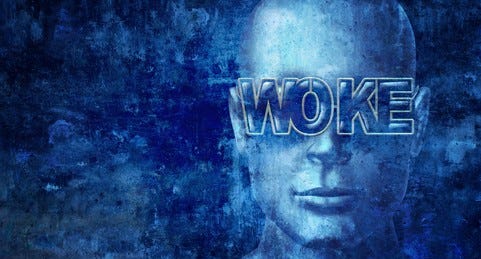Word Misappropriation: WOKE
A verbal series. Part 5.
[Part of an on-going series on word misappropriation]
John Cleese has recently ignited a Twitterstorm when he tweeted this:
Someone then proceeded to ask him:
“Serious question. What do you think "woke" means?”
To which Cleese has politely responded:
The truth is that I’ve grappled with the term myself. In fact, so much so that I’ve made a conscious effort to avoid using it.
Traditionally the term woke had referred to the idea that one is awakened to injustices. It was first used in the 1940s and was associated with black Americans fighting racism—something that they’ve undeniably had to face much of throughout the country’s unfortunate history.
As time went on, other activist groups took the term on to be applied more broadly towards awareness of social issues, prejudices, inequalities, and injustices.
It meant to be “awake” and aware of the truth—particularly that which unjust institutions may seek to keep you blind to.
This all seems rather reasonable, no? So why is it that as of late, the term “woke” has become associated so negatively?
This is yet another example of a phenomenon that I’ve been calling, “word misappropriation,” which is when the meaning of a word or term is changed so much that it becomes divorced of its original meaning.
So how did it happen?
One explanation, perhaps, is: Capitalism. Bear with me for a moment. Large corporations, as I’ve already established here, do not have human characteristics like compassion, empathy, or anything else of that nature. They are motivated, in their core, by profit. “Woke” is an area where they saw fit to capitalize. After all, there were already plenty of hashtags to pounce on like #BLM and #metoo. It allowed these conglomerates, many of whom, by the way, were contributing to atrocities overseas, to commodify social movements. They were looking to ride the coattails of activism.
And they did. Gillette took on toxic masculinity. Kendall Jenner gave a police officer a Pepsi at a protest. Starbucks encouraged its baristas to talk about race with customers. And Nike hired Colin Kaeperick, a player who refused to stand during the national anthem, for their campaign.
Brands became arbiters of morality. They’ve spent millions of dollars on what is essentially a chance to “virtue signal.” It didn’t go unnoticed.
But, corporations weren’t the only ones doing the virtue signalling…
With further amplification from corporations, thanks to millions of dollars in campaign spends, as well as further boosting by high-profile figures (eg. celebrities), regular people were engaging too. They were quickly jumping on to hashtags, changing their profile photo to black squares (which, turns out, is actually harmful—according to activists), sharing real and perceived stories of oppression, and doing anything they can to signal to their “tribe” that they, too, are part of it. Few would actually take any actions with real-life impact or would even educate themselves thoroughly on the subjects they were tackling, so it’s fair to say that attention-seeking behavior wasn’t the least of it either.
And the more this spread throughout society, largely via social media platforms, the more those who viewed themselves as “woke” started to feel like they have a monopoly on what is considered “good” and “righteous.” Around that time, increasingly, many had begun to see such gestures as empty and performative.
But, as groups mobilized using their collective hashtags, they’ve also started to transform into mobs. This is where, for many, they’ve become synonymous with “cancel culture.” These groups didn’t seek to merely call out true acts of injustice or discrimination, but rather, it became somewhat of a witch-hunt after those with whom they did not share agreement on some topic. Anyone who’d dissent or be ideologically opposed would quickly be labelled a racist, bigot, transphobe, white supremacist—or worse.
None of this had to be true because evidence isn’t needed in the court of public opinion. Here, the mob became judge, jury and executioner. The punishments were severe, too: public shaming, doxing, threats, and calls for the ‘offending party’ to be fired. Many were prosecuted for crimes they did not commit. Some never made it to the other side of the scandal—like University of North Carolina Wilmington professor Mike Adams who was harassed into early retirement and ultimately had committed suicide. Or take someone like Maria Tusken whose only “crime” was to speak out against a hostile mob that came after a fellow knitter when she shared excitement about her upcoming trip to India in a blog post, comparing it to “being offered a seat on a flight to Mars." The knitter mob condemned her for using “othering” language—she was pressured to apologize. The mob then turned towards Tusken, who stood her ground, despite it ultimately taking a significant toll on her business. There are countless such stories, with various endings. Many unhappy.
That’s when the term “woke” began to become more associated with things like identity politics, political correctness, virtue signalling, posturing, a sense of moral superiority, and the cancellation mob.
It stopped being about awareness of injustices, but rather about people who saw themselves so superior that they justified actions like harassment, abuse, and bullying because they knew better. In other words, they were engaging in narcissistic behavior and chasing power.
The term became a way of collectively labelling these individuals.
So it’s no wonder that there’s confusion amongst people as to why so many, including comedians like Ricky Gervais and John Cleese—and even Obama—choose to criticize or mock “woke culture.” After all, if they still associate the word with its original definition, then these people are going after a reasonable idea—that one should be aware of injustices.
But, language evolves, and “woke” is no exception. Its meaning has shifted.
If we can’t even have common definitions for language, what chance do we have of working together?
☕️ Enjoying this series and want to support my work by making a donation and buying me a coffee? Here’s how.
NOTICE TO READERS: Thank you for keeping me company. Although I try to make many posts public and available for free access, to ensure sustainability and future growth—if you can—please consider becoming a paid subscriber. In addition to supporting my work, it will also give you access to an archive of member-only posts. And if you’re already a paid subscriber, THANK YOU. Please also share, like, and comment. Got ideas for future posts? Email me.
Enjoy FREE Premium Membership for a Week! Sign up.
Who am I? I’m a writer with an overactive imagination and a random mind. Outside of Substack, you’ll find my work in publications such as Newsweek, WIRED, Variety, The Washington Post, The Guardian, Esquire, Playboy, Mashable, CNN Travel, The Independent, and many others.







I wish I could get my mom to read these.
This seems to be a tactic of what I would consider my political opposition. There is the same difficulty or resistance in defining Critical Race Theory and whether or not it's taught in schools. Anyway, going back to woke, I'd suggest checking out Nerdrotic's "A Woke Hollywood Revolution" which explores how woke culture is changing our culture and he borrows a lot from the latest Bill Maher bit that talks about woke and resemblances to Mao's Revolution.